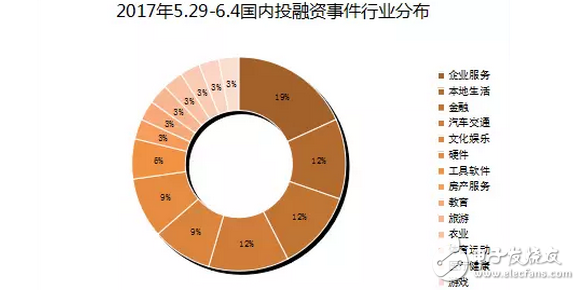After a round of speculation and disillusionment, VR has gradually become more rational. Last week, two VR-related companies were selected, and the other was the Tianhan culture authorized by Marvel and Disney IP, which will create a VR theme park based on the Avengers and Transformers. The other is the virtual reality commercial platform operation service provider Dream Technology, led by Cai Wensheng's Long Ling Capital. Has the VR market started to pick up?
In addition, the “auto-driving†field is still hot. Three companies in the field were voted last week, among which Weilai Automobile completed the C round of financing, Baidu, Tencent, Guangji Capital, Gaochun, Huaping, and Qingzhi. Technology and Chihiro Technology have received tens of millions of financing respectively.
There is also a unicorn company in the field of online education, and the question bank has completed the $120 million E round of financing, making it the single largest investment in the K12 online field to date. K12 has become one of the most competitive areas in the online education industry due to its market size of 100 billion. It is yet to be further observed how much market share the 猿 question bank can eat next.

With the launch of VR devices by giants such as Facebook (Oculus), Google, Sony, and HTC, the VR entertainment concept has also been adopted. However, compared with the expectation that the outside world is too optimistic, the lack of explosive products that ignite public interest and a large number of cheap equipment to impact the user experience are causing the VR being pushed into the altar to fall into the trap of the castle in the air.
Since last year, countless investment institutions and investors around the world have flooded into the VR market, but most people have not yet achieved substantial returns. To make the VR market even worse, it is not good news to acquire the VR originator Oculus, the first to get involved in the VR field. Recently, this VR week heavyweight player announced that he will close the award-winning Oculus Story Studio with short films such as Dear Angelica and Henry. Currently, the studio encourages 50 of its employees to apply for other jobs within Oculus, and ongoing projects will be cancelled.
Facebook will work with outside to create VR content in the future

Recently, according to foreign website variant, Facebook announced that the company will close its virtual reality (VR) movie studio Oculus Story Studio. When it comes to Oculus Story Studio, everyone around the world who is concerned about the VR industry is very familiar. In January 2016, Oculus Story Studio's virtual reality animated short film "Dear Angelica" shines at the Sundance Film Festival. In September of the same year, the virtual reality animated short film "Henry" won the Emmy Award for "excellent original interaction." project".
As a result, Oculus Story Studio has become the top studio for content production in the VR industry, and has attracted worldwide attention as soon as it was closed. However, Oculus content vice president Jason Lu Rubin posted a message on his personal blog "We decided to shift our focus from internal content production to support external production." It indicates that Facebook will switch to external cooperation to create VR content.
"We will spend $50 million to fund the creation of non-gaming VR content. This money will be directly invested in artists to help them turn the most creative and breakthrough ideas into reality." Jason Lu Rubin disclose. It can be seen that Facebook will invest in the external VR content studio in the future, like supporting the previous Oculus Story Studio. Therefore, Facebook closed Oculus Story Studio this time, announcing the failure of the internal incubation VR content strategy.
Why did Facebook close the fruitful studio?
Every VR industry person who sees Facebook closing Oculus Story Studio will think it is fake news. Since its inception, Oculus Story Studio has produced internationally acclaimed VR films such as Lost, Henry, Dear Angelica, and Quill, a tool for VR animation. Moreover, before being closed, Oculus Story Studio released the news to be the latest movie VR project Neil Gaiman's children's book "The Wolves in the Walls", which was not too much to describe this closure.
However, as one of the world's largest Internet companies, Facebook, closing Oculus Story Studio is not impulsive for three reasons.
First of all, the production cost is too high, "Lost" is less than ten minutes, but it cost $10 million. Someone has calculated an account, according to Wang Sicong's 4 billion net worth, he can only shoot 9 hours. Even if Facebook is not bad, but such high production costs, Facebook is still a small investment burden for shareholders.
Second, the content is too small. The original intention of Facebook to establish Oculus Story Studio was to provide content support for Oculus hardware products. However, in 28 months, Oculus Story Studio only launched three works. Nowadays, the sales of content-driven hardware in the VR industry has become a consensus. It seems that the low content output is closed.
Finally, the rise of external studios. With the popularity of VR entertainment concepts, VR content production has spawned studios such as Within, Baobab, Penrose, Felix & Paul, which also produced a lot of high-quality content, which was big at large film festivals such as Sundance and Tribeca. Received praise and each completed a considerable amount of financing. In contrast, Facebook's closure of Oculus Story Studio, embracing a more flexible external studio, can be more profitable.
For three reasons, Facebook not only closed Oculus Story Studio, but also spent $50 million to fund external studios to produce "experimental" non-gaming VR content. In the future, Oculus will also provide opportunities such as tutorials, development best practices and outreach opportunities. It is clear that Facebook's move will bring about a big change in the field of VR content production.
Beyond the excitement, the VR content industry is not so good.

Analysis of the causes and consequences of Facebook's closure of Oculus Story Studio, we can be sure that Facebook will continue to explore in the VR content field, although the form has changed. However, the closure of Oculus Story Studio has sparked a heated discussion in society, reflecting the current embarrassing situation of the VR content industry. The seemingly infinite VR industry has not been able to come up with explosive content that exceeds the user's expectations. It is not easy for everyone to tear open the emperor's new clothes.
First, the VR content industry has become a black hole for burning money. As mentioned above, the production cost of "Lost" has reached a point of 1 million US dollars for 1 minute. Such a large investment is acceptable in Hollywood blockbusters, but VR is an emerging industry. At a time when the hardware device has not reached a certain level, such high production costs have become the pain of all VR content creation players.
Second, the VR content industry has not been able to touch the user's pain points, leaving the game industry (represented by EA), the porn industry (represented by Pornhub) and the entertainment field (mainly sports events and concerts). In addition to the breakthrough in content production, high-quality VR films are lacking. Although there are already many VR short films that have won various awards, the user's viewing experience is also very shocking. But in many users' minds, VR viewing is just more dazzling than 2D and 3D video.
In order to make the user experience profound, some VR vendors use the horror film of "scareful" to deepen the user's memory, but it is counterproductive. The VR content industry wants to break the game, we must find the pain points of the users, and create audiovisual explosives that only use VR equipment to experience its essence, and have the opportunity to promote the VR industry's own "angry bird" phenomenon.
Third, the VR content industry can't keep up with the development of software and hardware. The production of VR content is not just a matter of shooting with a 360-degree panoramic camera, but a constant change in technology. For example, content production methods such as light field and sound field, as well as production processes (including acquisition, writing, playback effects, and content propagation speed), need to be improved and improved.
The impact of Facebook's closure of Oculus Story Studio on the VR content industry is bound to be far-reaching, although it has objectively brought many benefits to the external VR content studio. But from a capital perspective, Facebook's closure of Oculus Story Studio will add to the VR content industry. Under the impact of the VR content industry, investment enthusiasm will be impacted. If you want Nirvana to be born again, you can only see the bright future by only passing through this ridge and producing true good content.
Anti Reflection Screen Protector
Anti Reflection Screen Protector,Anti Glare Screen Protector,Anti Glare Screen Protectors,Anti Reflective Screen Protectors
Guangdong Magic Electronic Limited , https://www.magicmax.cc
